




|
|
|
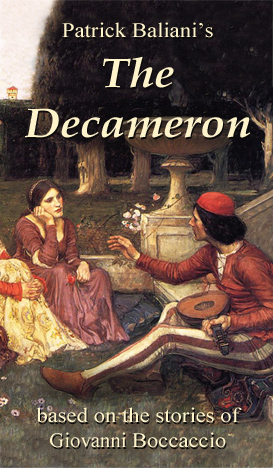
|
PRODUCTION
SPONSOR:
PAUL
BARBY
Directed by Joseph
McGrath
Music Direction by Harlan Hokin
April 28–May
15, 2011
Thursday–Saturday 7:30 P.M., Sunday
2:00 P.M.
Musical Preshow begins 15 minutes before curtain
Discussion with the cast and director follows all performances
Preview Night Thursday April 28, 7:30 P.M.
Pay-What-You-Will Nights
Thursdays May 5 & 12, 7:30 P.M.
Half-price Student Rush 15 minutes before curtain
Performance Schedule
The Rogue Theatre at The Historic Y
300 East University Boulevard
Free Off-Street Parking
See Map and Parking Information
|
It is the summer of 1348 and the Black Death rages in
Florence. A group of ten citizens have fled to a villa outside the city
walls where they fill their days by creating stories of love, lust,
adventure and fate. Spend an evening with an unlikely gathering of refugees
as they spin their tales, share their imaginations and discover worlds
unknown. Playwright Patrick Baliani will craft this translation of the
classic that inspired a world of writings, including Chaucer’s
Canterbury Tales.
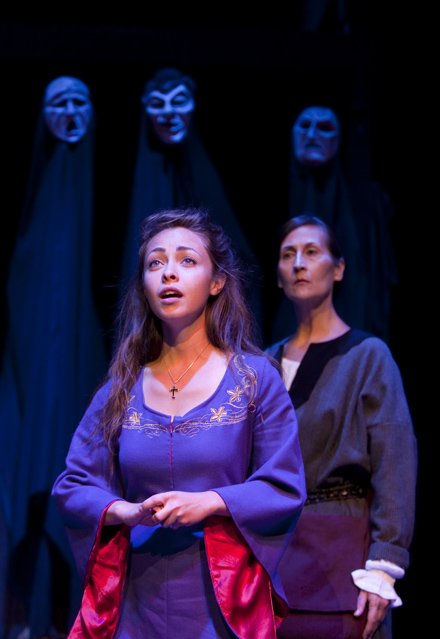
Rachel Lacy (Lisabetta) and Rosanne Couston (Rosaria)
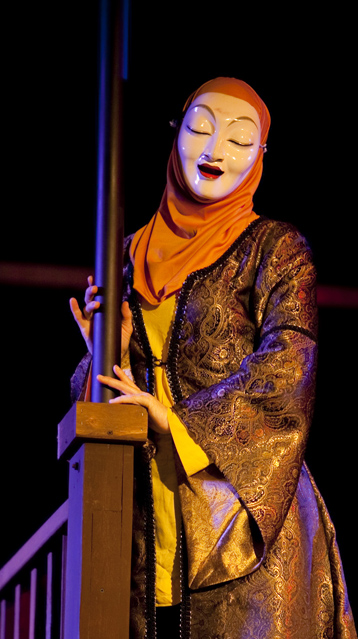
Patty Gallagher
Photos by Tim Fuller
About the
poster
Make your reservations now for a spectacular meal
before the performance at

533 N. 4th Avenue
Two blocks from The Rogue Theatre
On Opening Night, Friday, April 29,
Delectables will feature a special “Rogue menu.”
Rogue Season Ticket Holders
receive 20% off their meal at any time!
To make a reservation, call 520-884-9289
For more information, visit www.delectables.com
or Delectables’ Facebook page, Delectables
On Fourth
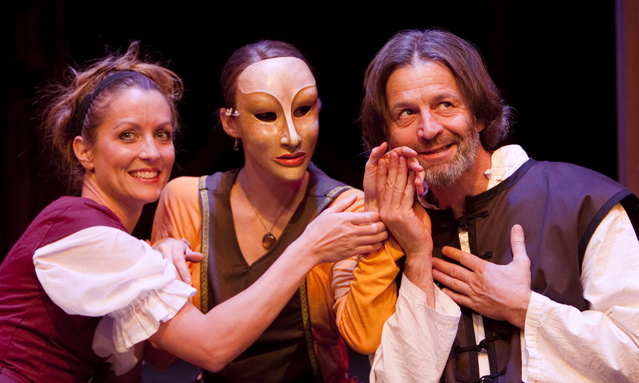
Angela Horchem, Jill Baker and David Greenwood
Photo by Tim Fuller
In Rehearsal at The Rogue
As part of The Rogue Theatre’s
continuing commitment to foster a dialogue with our audience about the
challenging, provocative and complex ideas behind quality dramatic language
and literature, Dr. Carrie J. Cole, our season dramaturg, has prepared
background resource material to introduce our theatregoers to The Decameron. Topics include:
Boccaccio and His Context
Rites of Passage/Religious Parallels
To Whet the Appetite…
Further Resources
The document can be downloaded here.
The file is viewable in Adobe Reader, downloadable here.
Press
A life-affirming Decameron at Rogue Theatre
Boccaccio’s bawdy tales told with gusto
Review of The Decameron by Kathleen
Allen in the May 6 Arizona Daily Star
Dazzling Decameron
Rogue triumphs with local playwright Patrick Baliani’s superb new version of an
Italian classic
Review of The Decameron by Nathan Christensen
in the May 5 Tucson Weekly
Playwright’s vision reshapes medieval
Decameron tales
Play based on 14th Century stories
Review of The Decameron by
Dave Irwin posted May 4 on TucsonSentinel.com
Human Thing: Of Boccaccio, Baliani, Alchemy, and
Desire
Article on The Decameron by
Anna Swenson posted May 4 on TheDesertLamp.com
A very human Decameron
Review of The Decameron by Chuck Graham on May 1 in Let The Show Begin! at TucsonStage.com
Campus Creatives: Patrick Baliani
English prof translates Italian drama for the American stage before you're even awake
Preview of The Decameron by Jazmine Woodberry in
the April 27 Arizona Daily Wildcat
How playwright Baliani adapted classic for Rogue
Preview of The Decameron by Kathleen
Allen in the April 22 Arizona Daily Star
Playwright and Direction
|
|
|
|
Patrick Baliani (Playwright) returns to The Rogue Theatre after translating and adapting Pirandello’s Six Characters in Search of an Author in 2008. His original plays been performed in New York, Los Angeles, Seattle, Phoenix, Prescott, and Tucson. He is one of twenty Arizona artists in all fields to be selected by the Creative Capital Foundation to participate in the 2007 Arizona Artist Project. He was awarded the Arizona Commission on the Arts Artist’s Project Grant in 2005 for his play, Lie More Mountains. He received the National Play Awardfrom the Los Angeles National Repertory Theatre Foundation and was awarded the Arizona Commission on the Arts Playwriting Fellowshipfor his play, A Namib Spring. He has received a Collaborative Artists Grant and was awarded a Tucson/Pima Arts Council Playwriting Fellowship.He has been a Guest Playwrightat symposia sponsored by the Young Playwrights, Inc., the Arizona Commission on the Arts, and the National Association for Theatre in Higher Education. His first play, Figs and Red Wine, received the Arizona Theatre Company Genesis Award. Patrick is on the faculties of the English Department and the Honors College at the University of Arizona, where he also teaches for the Humanities Seminars Program.
|
Joseph
McGrath (Director) is a graduate of the Juilliard School of Drama and is the Artistic Director for The Rogue Theatre for which he has performed in many of its plays. Joe was most recently seen as Deeley in Old Times, Caliban in The Tempest, Pastor Manders in Ghosts, The Man/Naga in Naga Mandala, and Iago in Othello. In 2009, Joe won the Arizona Daily Star Mac Award for Best Actor for his portrayal of Tobias in A Delicate Balance. Joe also authored and directed Immortal Longings for The Rogue and has directed The Balcony, Endymion, The Maids (winner of the Arizona Daily Star 2007 Mac Award for Best Play), Red Noses and Our Town. He has toured with John Houseman’s Acting Company, performed with the Utah Shakespearean Festival, and he is a frequent performer with Ballet Tucson appearing in The Hunchback of Notre Dame, Cinderella, A Midsummer Night’s Dream, Dracula and The Nutcracker. He has also performed with Arizona Theatre Company, Arizona Opera, Tucson Art Theatre, and Arizona OnStage. Joe owns, with his wife Regina Gagliano, Sonora
Theatre Works, which produces theatrical scenery and draperies. |
|
Director’s Notes
It has always been a puzzle for me to reach back before the Enlightenment and try to understand the life and people that came before. When Patrick and I embarked on The Decameron, it seemed to me that this was one of the project’s greatest challenges. What is the perspective of people who live so close to the earth, to death, and to God? It is 1348 A.D. Fourteen years of age is marriageable, forty is wizened. Drinking the water is always a risk. Drinking something with alcohol in it is much safer. Many able and prominent figures of the community are wise…and illiterate. The Catholic Church is not an option or a choice; it is the governing framework for living. Belief is somewhat beside the point.
The universe is very small. The Earth is at its center. The stars emit the glow of the Divine just beyond arm’s reach.
Boccaccio is part of a tradition that enlarged this universe immeasurably for us. This is counterintuitive. After all, doesn’t Dante write of the grandeur of angels and devils, hell and paradise, in poetry, while Boccaccio tells us about regular people, in prose? Indeed he does. But in bringing us to the earth, Boccaccio shows us what is real among us. It is remarkable, for instance, that he describes both a voracious feminine sexual appetite, and the corruption of the clergy. Things not spoken about, but common to the understanding of the time. And both are phenomena often treated with care and secrecy even in our own culture. Boccaccio, by shedding light on what is real, begins, along with other voices of the time, a journey of self-knowledge for the West. In less than a century people will be looking to the sky and seeing a much more vast and complex universe.
I confess to having been completely ignorant of The Decameron a few years ago. I fell in love with Lisabetta through the Keats poem “Isabella and the Pot of Basil” (not a very good poem, Patrick insists). I asked Patrick about it, which started a discussion that led eventually to the production you will see before you. How delightful to discover another great voice of our literary heritage! And as we wear the lives and loves of these characters, what a joy it is to find in ourselves this tremendous range of laughter and sorrow.
In Boccaccio’s world life is short and uncertain. It is lived, with brio. His characters are sudden and passionate. We modern Americans are more staid. We instinctively keep our interactions politic. We are careful not to offend, or to cover our offenses with a patina of tolerance. With The Decameron, along with its storytelling challenges, our mission has been to confront one another openly, with as much passion—laughter, and anger, and love—as we might in 14th century Italy, when life was short and the Great Plague was raging outside the door—and working its way in.
—Joseph McGrath, Director of The Decameron
director@theroguetheatre.org
A Word from the Playwright
How to transform 800 pages—one hundred stories—of syntactically dense, rhythmically ornate, medieval Italian prose into one night of contemporary theatre? That was the goal: translating and adapting Boccaccio’s classic, The Decameron, for The Rogue stage.
Until recently, I firmly believed it was Joe McGrath’s idea to produce one of the stories, The Pot of Basil, and that my prompting further encouraged us to collaborate on The Decameron as a whole. Rereading his email to me dated two and a half years ago, my memory stands corrected. Joe writes: “12/8/08. Just off the top of my head—a stage treatment of The Decameron?” So began the give and take process that has steadily progressed as Joe and I, Cindy Meier, Harlan Hokin, John Wilson, The Rogue crew, the cast, and others, have shared in the terrifically challenging work of selecting, translating, adapting, revising, improvising, rehearsing, scoring, choreographing, producing, and now performing ten of Boccaccio’s classic stories as one play.
For months I struggled with finding a form to contain the work. I had begun to draw as a way to see things differently. I had read 99 of the stories. (Not wanting to “finish” the book, I didn’t.) I had selected ten of the tales and devised a tentative sequence. The number ten, of course, is essential to The Decameron—ten days, ten storytellers. But ours was to be one story, one night, one dramatic action. Joe and I felt from the start that the Plague should be extended beyond the exclusive place it occupies in Boccaccio’s Prologue. Still, I could not realize our own narrative/dramatic “frame.” Joe said: “Let go of all that. Take whatever time you need. Do nothing but translate the stories as close to the Boccaccio as possible.” It was a major turning point.
About the translation: Boccaccio’s language is full of nuance, double and triple entendre, innuendo (sexual and otherwise), musicality, muscularity. Take, for instance, the laconic Pot of Basil tale. The difference between two vowels—”testo,” meaning “pot” in Italian, and “testa,” meaning “head”—imparts thematic significance in a way irreproducible in English. Lisabetta is hardly a pothead! The wordplay in English must occur elsewhere. Given that Boccaccio begins and ends his collection on a theme of generosity, the notion fell to my lap that ‘to give’ has aptly suggestive meanings. Part way up the climbing of a pear tree I found my first English wordplay. Oh, happy day!
For weeks after the translations were completed, I simply could not move beyond the language I had labored to get just right. “Now forget Boccaccio,” said Joe. “From here, your voice is more important to us than his.” It happened that the longest story in The Decameron, The Scholar’s Revenge, provoked me. “When did the earth beneath you begin to quiver?” said the character Rinieri one day to his lover, Elena. That night I anxiously sent the “tower scene” that emerged to Joe and Cindy. Their response, by morning, confirmed that the writing of the play was underway. The Pot of Basil, which I like to think of as “Joe’s story,” and The Scholar’s Revenge, which I think of as “mine,” became the narratives extended among the others and throughout the frame.
Sources in addition to Boccaccio were instructive. The University Library and Special Collections provided studies in literary history and criticism. Two existing translations in particular—one British, by G.H. McWilliams, the other American, by Mark Musa and Peter Bondanella—were especially valuable. Fiction and dramatic literature complemented my research—Camus, Aeschylus, Bobby Kennedy all found their way into the play. The dynamic qualities of a brilliant cast, the professionalism of The Rogue staff, the wizardry of a musical director who is surely an alchemist in the best medieval sense of the word, have been a treasure. I am most grateful to Joe—for his vision, empathy, erudition. He was always supportive, inspiring, patient.
At the first rehearsal I told the actors: “Have fun. Find the urgency.” We invite you to do the same. Here is one play (we hope), ten stories (some say nine and a half), many richly collaborative efforts, including yours as the audience. We hope you enjoy the show.
—Patrick Baliani, Playwright
The Cultural Context
of The Decameron
Giovanni Boccaccio (1305-1375) is in the pantheon of the greatest authors
of world literature. For centuries afterwards, his Decameron
was considered the best prose work composed in a living language. Its
astute characters and their witty dialogue exemplified Renaissance ideals
of human ingenuity; Renaissance readers appreciated how the characters
used their intelligence to change their fates. From a literary perspective,
Boccaccio’s humorous tales and his concise language were the model
for literary prose. Numerous authors imitated Boccaccio, such as Matteo
Bandello who penned the source for Shakespeare’s Romeo and
Juliet.
The Decameron did not only influence the evolution of Italian
literature, however. With its frame story and panoramic view on contemporary
society, Boccaccio had a major impact on Geoffrey Chaucer’s Canterbury
Tales. Chaucer appreciated how Boccaccio recreated the expressiveness
of Latin in a living language, Italian. Throughout his works, Chaucer
tried to emulate Boccaccio’s subtlety in another “barbarous”
tongue, English. Thus, it can be argued that the genesis of English
literature rests with Boccaccio.
Because of its ribald tone, the Decameron has had numerous
detractors as well. When the friar Girolamo Savonarola ran the city
of Florence as a de facto totalitarian state, copies of the
Decameron were burned (1497). When the Inquisition established
the Index of Prohibited Books (1559), Boccaccio’s masterpiece
was listed on it. The Catholic Inquisition took less issue with its
bluntness about sexuality than with its depiction of clerical abuses.
When society’s mores changed in the 1970s, the name “Decameron”
became synonymous with sexual cinema. In 1971 director Pier Paolo Pasolini
made a cinematic version of Boccaccio’s stories as part of his
Trilogy of Life. Pasolini’s frank representation of sex
and sexuality set the tone for other filmmakers. Afterwards, numerous
movie “Decamerons” were produced (including several pornographic
versions). But many of the films missed Boccaccio’s point: frequently,
sex was merely the impetus for the action in Boccaccio’s narratives.
Sex—or sexual yearning—allowed Boccaccio to demonstrate his protagonists’
sagacity, their humanity. Although the depiction of sex is commonplace
nowadays, rarely has it been presented as so joyful and pleasurable
as in the Decameron.
This is not to say that Boccaccio’s Decameron is only
about sex. It is set against the worst calamity ever documented, the
Black Plague of 1348. The Plague swept through Eurasia, killing over
one-third of the population. Yet over and over in his Decameron
Boccaccio emphasizes the pleasures of life. In short, the Decameron
documents humankind’s fierce embrace of life in the face of utter
extermination. Although we no longer experience such a drastic mortality,
Boccaccio communicates a message that continues to resonate: even today
people respond to hard times with joy and laughter.
—Fabian R. Alfie, Department Head, Department of
French and Italian, University of Arizona
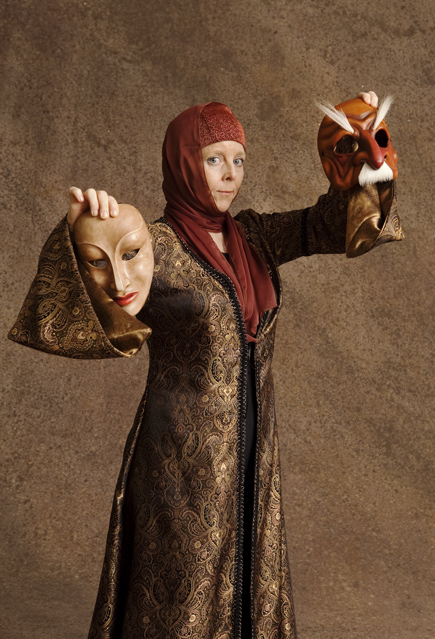
Patty Gallagher (Alibech)
Photo by Tim Fuller
The Masks
The masks used in The Decameron are from the collection of the UC Santa Cruz Theater Arts department and from my personal collection. They represent the artistry and love of their makers, my friends from across the world, including: Newman (the leather commedia masks), Aaron Cromie (the complex character masks), and the Balinese masters Nyoman Setiawan and Ida Bagus Anom (the wooden masks).
Theatrical mask performance has its roots in ancient classical drama and, earlier, in ritual religious practices throughout the world. Mask usage varies throughout geography and history: each mask set or “family” has a set of specific traditions and performance practices on which it depends. The best mask performance work I’ve seen respects tradition but moves beyond it, asking what can be learned through conversations and even collisions of globally and historically distinct mask practices.
This project has been fertile ground for that kind of investigation. In his staging, director Joe McGrath has chosen to juxtapose families of masks to great effect. Among my favorite examples of this occurs at the beginning of Act 2. The character of Malgherida di Ghisolieri is portrayed with a Balinese wooden mask, while that of her suitor Maestro Alberto wears a complex character mask. In the gulf of longing and desire that separates them stand the mocking villagers. The villagers are portrayed with wooden masks carved by a traditional Balinese artist who was inspired by the designs of Italian commedia dell’ arte-- a global conversation indeed
My beloved teacher and mentor I Ketut Kantor (of Batuan, Bali) used to tell me that masks gain power every time they are worn. It gives me such joy to know that these masks find new life, new power through this production. Finally, I am grateful to you, the Rogue audience, for welcoming these masks to Tucson. Thank you for the life that you too breathe through and into them: they are (as I am) changed and strengthened by your presence.
—Patty Gallagher, Artist in Residence
|
|
|
Setting |
| An abandoned villa outside of Florence,
near Certaldo. Spring 1348. |
| |
Cast |
| Pampinea, formerly an Abbess in the countryside
of Tuscany |
|
Cynthia Meier |
| Lisabetta, a young woman from Messina |
|
Rachel Lacy |
| Lidia, a Florentine wife |
|
Jill Baker |
| Natan, of indeterminate origin |
|
David Greenwood |
| Dioneo, a young man from Florence |
|
Nic Adams |
| Alibech, originally from Tunisia |
|
Patty Gallagher* |
| Elena, a Florentine widow |
|
Laura Lippman |
| Rinieri, a Florentine scholar |
|
David Morden* |
| Rosaria, Lisabetta’s Maidservant |
|
Rosanne Couston |
| Amalia, wife of Pietro di Vinciolo |
|
Angela Dawnielle Horchem |
*Member
of Actors’ Equity Association,
the Union of Professional Actors and Stage Managers in the United
States,
appearing under a Special Appearance Contract
|
Cast Biographies
|
|
|

|
Nic Adams (Dioneo) is the General Manager for The Rogue Theatre for which he has worked, both onstage and off, in its productions of Old Times, The Tempest, Ghosts, Naga Mandala, Othello, Krapp’s Last Tape, Orlando and Six Characters in Search of an Author. He is the Artistic Director of The Now Theatre, which co-produces the “Rogue After Curfew” series, and was recently nominated for an Arizona Daily Star MAC Award for his performance in The Now’s production of Overruled. Additionally, Nic is a playwright. His piece, Chavezplay: An Undeviling, was recently produced as a part of the UA’s Spring Studio Series. |
Jill Baker (Lidia) has previously performed with The Rogue Theatre in Ghosts, Naga Mandala, Animal Farm, Red Noses, The Cherry Orchard and The Good Woman of Setzuan. Other favorite roles include Catherine in Proof at Beowulf Alley Theatre and Bertha in The Father at the Berkshire Theatre Festival. |
 |

|
Rosanne Couston (Rosaria) is a Tucson native. She holds a Bachelor of Fine Arts and a Master of Arts from the University of Arizona. She has worked with many local community theaters, including Borderlands Theater, Invisible Theater, Tucson Parks and Recreation Community Theater, Mercury Productions, and Live Theater Workshop. She currently works as a Librarian at Pima Community College where she enjoys working with students and teaching them that not all human knowledge and wisdom is found on Wikipedia. |
Patty
Gallagher (Alibech) is Associate Professor of Theatre Arts at University of California Santa Cruz where she teaches movement, mask, Balinese dance, and clown traditions. With The Rogue, she has performed the roles of Shen Te in The Good Woman of Setzuan, Ranevskaya in The Cherry Orchard, Winnie in Happy Days (most recently for The Rogue’s tour to Bangalore, India), Sonnerie and Scarron in Red Noses, Orlando in Orlando, the Player in Act without Words, Emilia in Othello, Rani in Naga Mandala and Ariel in The Tempest. She has worked with Shakespeare Santa Cruz, The Folger Shakespeare Theatre, California Shakespeare Theater, The New Pickle Circus, Ripe Time Theatre, Two River Theatre, Teatro Cronopio and Grupo Malayerba. She has performed, choreographed and directed workshops in Asia, South America, Europe, and the U.S. In 2006 she was Fulbright Scholar in Quito, Ecuador. She holds a doctorate in Theatre from University of Wisconsin–Madison, and she is Director in Residence for the Clown Conservatory, San Francisco Circus Center. |
 |

|
David Greenwood (Natan) was a member of the cast of The Rogue Theatre’s first production, The Balcony. He has appeared locally in Shining City and The Birthday Party at Beowulf Alley Theatre and The One-Armed Man, The Disposal and The Glass Menagerie at Tucson Art Theatre. |
Angela Dawnielle
Horchem (Amalia) currently serves as the Project Director for Stories that Soar! She graduated from Dell’Arte International School of Physical Theatre where she studied Commedia, melodrama, and clown. While there, she travelled to Bali, Indonesia where she spent six weeks studying shadow puppetry and traditional Topeng dance. She earned her M.A. in theatre from the University of Nebraska at Omaha where she focused on movement roles in Metamorphoses, The Arabian Nights, Much Ado About Nothing and Mother Courage and Her Children. She worked four consecutive years for the Nebraska Shakespeare Festival, where her favorite role was Iras/Mardian in Antony and Cleopatra. She was a guest ensemble artist with Omaha’s The Witching Hour and Chicago’s National Headquarters. While in Chicago, Angela worked for CircEsteem & the Chicago Youth Circus writing grants and directing circus performances. In New York City, she was a teaching artist for the Hudson Valley Shakespeare Festival. In Tucson, Angela performed in WONDERHEADS, an evening of full-face mask. She also co-founded Clown, R.N., a clown therapy program working with Tucson-area hospitals and clinics. |
 |

|
Rachel Lacy (Elisabetta) graduated from the University of Arizona in December with majors in Theatre and French. She was the student director for the Arizona Repertory Theatre’s production of Violet and the director of the Fall Studio Series production, Power 2K10. Rachel recently acted in the Invisible Theatre’s production of Miracles. This is her first production with The Rogue. |
Laura
Lippman (Elena) has previously performed with The Rogue Theatre as Anna in Old Times. She was the assistant director for Rogue’s production of A Delicate Balance last season, and she recently directed Blackbird at Beowulf Alley Theatre Company, which earned her the 2010 Arizona Daily Star Mac Award for Best Director of a Drama. Selected acting credits include Annie in All My Sons, Phoebe in As You Like It, Lady MacDuff in Macbeth, Flo in Dorothy Parker’s Big Blonde plus participating in the development of many new plays and devised theater projects. Laura teaches introductory acting at the University of Arizona. She received her undergraduate theater training at Bennington College and the Welsh College of Music and Drama in Cardiff, Wales. She earned her MFA in Directing from Carnegie Mellon University. |
 |
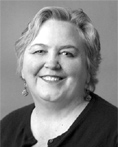 |
Cynthia Meier (Pampinea) is the Managing and Associate Artistic Director for The Rogue Theatre for which she has adapted and directed James Joyce’s The Dead, directed Old Times, The Tempest, Naga Mandala, The Four of Us, Othello, Animal Farm, Orlando, Happy Days, The Good Woman of Setzuan, The Fever and The Cherry Orchard, and performed in many of the productions including The Goat for which she received the Arizona Daily Star’s 2008 Mac Award for Best Actress. Cynthia has also performed in Cat on a Hot Tin Roof (Arizona Repertory Theatre), A Streetcar Named Desire (Arizona Theatre Company), Blithe Spirit and A Midsummer Night’s Dream (Michigan Repertory Theatre), Romeo & Juliet and Chicago Milagro (Borderlands Theatre), A Namib Spring (1999 National Play Award winner), and Smirnova’s Birthday, The Midnight Caller, and The Ballad of the Sad Cafe (Tucson Art Theatre). Cynthia teaches Speech at Pima Community College and holds a Ph.D. in Performance Studies from the University of Arizona. |
David
Morden (Rinieri) has appear ed with The Rogue Theatre as Stephano in The Tempest, Brabantio and Montano in Othello, Editor Webb in Our Town, in the ensembles of Animal Farm and Orlando, as Madame Pace in Six Characters in Search of an Author, The Pope in Red Noses, Yephikhov in The Cherry Orchard, The Man in the Silver Dress in the preshow to The Maids and Glaucus in Endymion. He has acted locally with Arizona Opera (The Pirates of Penzance, The Threepenny Opera), Arizona Onstage Productions (Assassins), Actors Theatre (The Bible: The Complete Word of God (Abridged)) and Green Thursday Theatre Project (Anger Box, Rain), of which he was a co-founder. David has also directed The Rogue’s productions of Ghosts, A Delicate Balance, The Goat (2008 Arizona Daily Star Mac Award), Six Characters in Search of an Author and Krapp’s Last Tape, Not I and Act Without Words. David has also directed productions with Green Thursday, Oasis Chamber Opera, DreamerGirl Productions, and Arts for All. |
 |
|
|
|
Musicians |
| Paul Amiel |
| Harlan Hokin, Music Director |
| Robert Villa |
|
|
|
|

|
Harlan
Hokin (Musical Director/Composer) has performed extensively as a solo singer and director with many international early music ensembles including Sequentia and P.A.N. (Project Ars Nova), and did a stint with the Oregon Shakespeare Festival many years ago. He earned a doctorate in historical performance practice from Stanford, and has taught at Stanford and UC Santa Cruz. Harlan is an active workshop teacher and writer on topics of interest to singers and early music performers, and teaches music theory and literature at Pima Community College. He has served the Rogue as music director since its inception, and acted as vocal director for Arizona Onstage’s production of Assassins. He is currently serving on the Board of Directors of the Arizona Early Music Society, and is the father of two nearly perfect former children. |
Paul
Amiel (Musician) is a multi-instrumentalist who has extensively
studied and performed Medieval, Turkish, Arabic, Chinese, Celtic
and Japanese music both here and abroad. He founded and performs
with the Summer Thunder Chinese Music Ensemble, the traditional
Japanese music duo Musou, and Zambuka (Middle Eastern, Turkish,
and Mediterranean music and dance). Paul has performed music
for The Rogue Theatre’s productions of The Tempest, Krapp’s
Last Tape, Our Town, Immortal Longings,
Orlando, The Good Woman of Setzuan, Endymion
and The Dead. |

|

|
Robert
Villa (Violin) has performed music for The
Rogue Theatre’s productions of The Dead, Endymion,
Our Town, and Krapp’s Last Tape. Robert
is a student technician at the Human Origins Genotyping Laboratory
at University of Arizona and the Vice President of Tucson Herpetological
Society.
|
Music Director’s
Notes
Some of our preshow and incidental pieces come from mid 14th century Florence—the very ones the young ladies and gentlemen of The Decameron’s “merry brigade” could well have sung and played for each other before each daily round of story telling. Signor Boccaccio himself would likely have known some of these pieces and their composers.
Other pieces have been newly composed to suit our play. I have taken care to reflect the formal and rhythmic style of “Trecento” Italian music, while freely employing modern harmonic and melodic combinations that are suitable and recognizable to our modern affective sensibilities. Our way of hearing is not necessarily the same as that of 14th century Florentines. Their rhythmic and harmonic expectations were simply different from ours. Modern ears are sometimes surprised to discover the intended meaning in some Trecento pieces. For example, joyous poetry may seem not to be well matched to somber or overly complex sounding music. But what sounds sad or incongruous to us may have had a totally different effect on Trecento ears. The concept of major/minor keys did not exist in Boccaccio’s era. They had never heard Mozart, Debussy, Stravinsky or John Williams! Our conventions and expectations were not the same as theirs were. The details of scales or melodic “modes” and the specific affects associated with and created by their careful use and intermixture ruled musical choices and results.
—Harlan Hokin, Musical Director
|
|
|
Composers and Sources |
| Franceseo Landini [1325–1397] |
| Guillaume Dufay [1397–1474] |
| Guillaume Machaut [1300–1377] |
| “Estampie” (instrumental dance form) Manuscript source: London, Add. 29987, fol56 |
| Harlan B. Hokin [1950–present] |
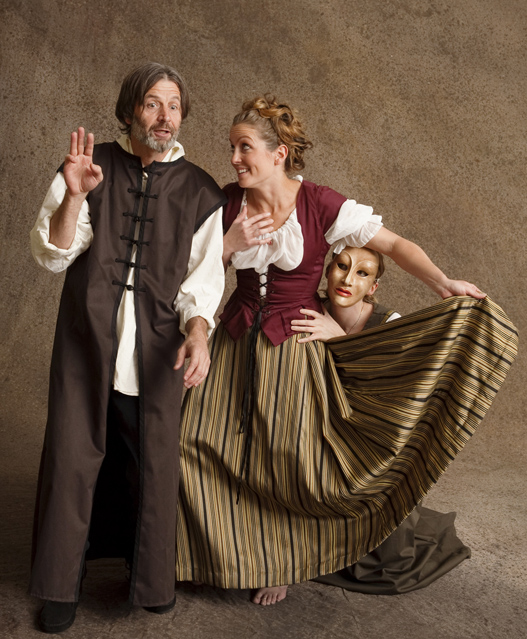
David Greenwood, Angela Horchem and Jill Baker
Photo by Tim Fuller
|
|
|
Designers |
| Costume Design |
|
Cynthia Meier |
| Music Director |
|
Harlan Hokin |
| Lighting Design |
|
Clint Bryson |
| Scenic Design |
|
Joseph McGrath |
| Preshow Choreography |
|
John Wilson |
| |
Production
Staff |
| Stage Manager |
|
Ashley Simon |
| Assistant Director |
|
Bryan Rafael Falcón |
| Costume Construction |
|
Cynthia Meier & Karen DeLay |
| Dramaturg |
|
Carrie J. Cole |
| House Manager |
|
Susan Collinet |
| Box Office Manager |
|
Thomas Wentzel |
| Box Office Assistant |
|
Anna Swenson |
| Snack Bar Manager |
|
Leigh Moyer |
| Snack Bar Assistant |
|
Shannon Macke |
| Poster and Program |
|
Thomas Wentzel |
|
|
|

|
Clint
Bryson (Lighting Designer) has designed lights
for nearly every Rogue Theatre production. Other lighting design
credits include As Bees in Honey Drown and Golf Game
for Borderlands, Woman in Black for Beowulf Alley, and
The Seagull for Tucson Art Theatre. Clint is currently
the Shop Foreman, Production Technical Director and Marketing
Director for Catalina Foothills Theatre Department where he designs
and coordinates the construction of all scenery. He is also a
member of Rhino Staging Services, and a regular participant in
Arizona Theatre Company’s Summer on Stage program where
he designs and builds the scenery as well as teaches production
classes. |
John Wilson
(Preshow Choreography) Professor Emeritus of the University of Arizona Dance
Department, played Prospero in The Rogue Theatre’s production of The Tempest. He started his performing life at age four as a hoofer
and tapped his way into his teens when he played his first Shakespearean
role, Snug the Joiner, in A Midsummer Night’s Dream.
In college and summer stock he honed his skills as both a comical
and classical actor in productions of Molière, Pirandello,
Ibsen, Shaw, Williams, Strindberg, Congreve, the Absurdists and
the Bard. After a tour as a Marine Corps helicopter pilot, he
completed joint PhDs in dramatic literature and dance at the University
of Wisconsin-Madison. He has choreographed 98 works for college
and professional companies during his career as a professor of
dance and has won eight teaching excellence awards. Diane, his
wife of 54 years, gave him encouragement to play the role of Prospero
for The Rogue. Retired in Tucson, John and Diane have three beautiful
children and seven gorgeous grandchildren. |

|
 |
Ashley Simon (Stage Manager) was Assistant to the Stage Manager for Arizona Theatre Company’s Lost in Yonkers, Woody Guthrie’s American Song, Backwards in High Heels, The Glass Menagerie, Ain’t Misbehavin’, The Kite Runner, A Raisin in the Sun, Hair and The Lady with All the Answers. Ms. Simon was the Stage Manager for The Rogue Theatre’s The Four of Us, Othello and Immortal Longings, and she stage managed The Mousetrap, Same Time Next Year and Forever Plaid at The Theater Barn in the Berkshires. At Florida Stage, she was Assistant to the Stage Manager for the world premiere of Deborah Zoe Laufer’s End Days and Aaron Posner’s A Murder, A Mystery and A Marriage. |
Bryan Rafael Falcón (Assistant Director) is a director/designer, recently re-based in Tucson, who also spends time crafting the occasional independent film. He is the former artistic director of two Indiana-based theater companies: The Backporch Theater Company (a Shakespeare traveling troupe) and New World Arts (an experimental black box theater company). His most recent projects include assistant directing The Tempest at The Rogue and he is currently in pre-production work for his direction of Tracy Letts’ Bug at New World Arts. Every once in awhile he flexes a pen to stroke a quiet phrase or two. |

|

|
Carrie
J. Cole (Dramaturg) first collaborated with The
Rogue Theatre as fight director for last season’s Othello,
and has joined The Rogue as dramaturg for the 2010-2011 season.
She appeared as Iris in this season’s The Tempest.
Carrie has previously been seen on Tucson stages playing Rosalind
in As You Like It, Rosaline in Love’s Labour’s
Lost, and Alais in A Lion in Winter. An Assistant
Professor in the UA’s School of Theatre, Film, & Television,
Carrie oversees the BFA Dramaturgy Program, and serves as Resident
Dramaturg for Arizona Repertory Theatre. She is currently working
with the Network of Ensemble Theaters (NET) as a respondent to
their MicroFests in Atlanta, Los Angeles, and Philadelphia. |
Susan
Collinet (House Manager) received her A.A. Degree
from Pima Community College in 2005, and her B.A. in Creative
Writing and English Literature from the University of Arizona
in 2008. Before returning to college as a non-traditional student,
Susan spent twenty years in amateur theater, mostly on the East
coast, as well as in the American Theater of Brussels and the
Theatre de Chenois of Waterloo, Belgium. She has worked in such
positions as volunteer bi-lingual guide in the Children’s
Museum of Brussels, Bursar of a Naturopathic Medical school in
Tempe, Arizona, and volunteer assistant Director of Development
of the Arizona Aids Project in Phoenix. Susan is currently peddling
a manuscript of poetry for publication and continually working
on collections of creative nonfiction and fiction. Her writing
has won awards from Sandscript Magazine, the John Hearst Poetry
Contest, and the Salem College for Women’s Center for Writing,
and has been published in the 2010 Norton Anthology of Student’s
Writing. In addition to being House Manager, Susan acts as Volunteer
Coordinator for The Rogue. |

|
|
|
|
Our Thanks |
Arizona Daily Star |
|
Tim
Fuller |
Tucson Weekly |
|
Chuck Graham |
Shawn Burke |
|
Jesse Greenberg |
| Karen DeLay |

Rosanne Couston (Rosaria) and Rachel Lacy (Lisabetta)
Photo by Tim Fuller
Performance
Schedule for The Decameron
Location: The Rogue Theatre at The Historic Y, 300 East University
Boulevard
Free off-street parking! Click here
to see map and parking information.
Performance run time is approximately 2 hours and 15 minutes, not including
music preshow or post-show discussion. There will be one 10-minute intermission.
Thursday April 28, 2011, 7:30 pm PREVIEW
Friday April 29, 2011, 7:30 pm OPENING
NIGHT
Saturday April 30, 2011, 7:30 pm
Sunday May 1, 2011, 2:00 pm matinee
Thursday May 5, 2011, 7:30 pm, PAY-WHAT-YOU-WILL
Friday May 6, 2011, 7:30 pm
Saturday May 7, 2011, 7:30 pm
Sunday May 8, 2011, 2:00 pm matinee SOLD OUT
Thursday May 12, 2011, 7:30 pm, PAY-WHAT-YOU-WILL SOLD OUT
Friday May 13, 2011, 7:30 pm
Saturday May 14, 2011, 7:30 pm
Sunday May 15, 2011, 2:00 pm matinee SOLD OUT
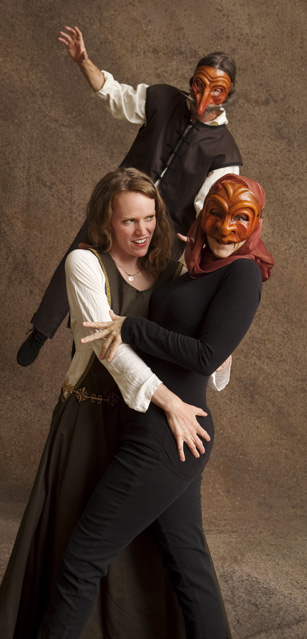
David Greenwood, Jill Baker and Patty Gallagher
Photo by Tim Fuller
|
 T U C S O N A R I Z O N A
T U C S O N A R I Z O N A T U C S O N A R I Z O N A
T U C S O N A R I Z O N A